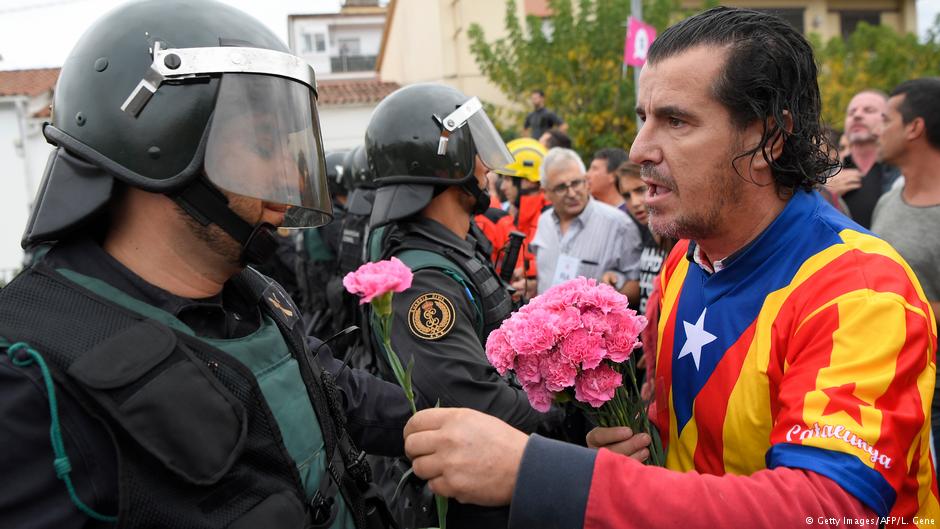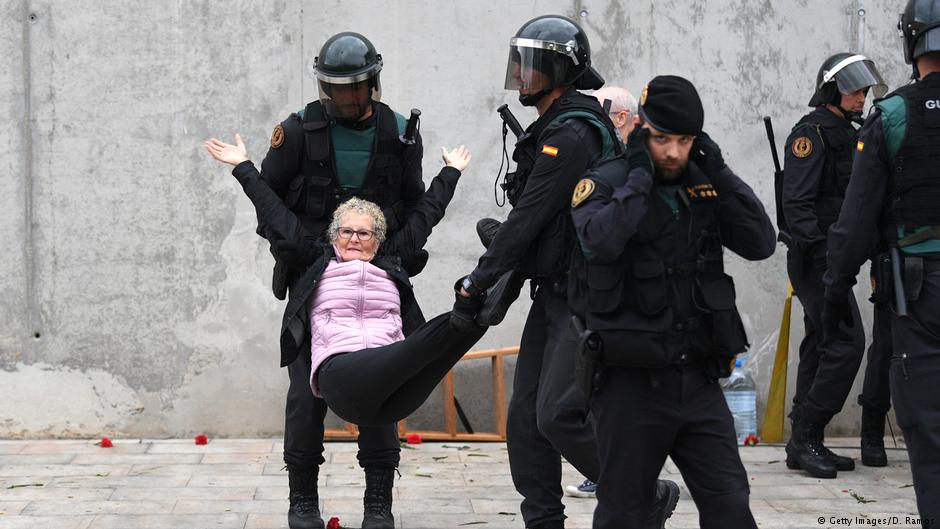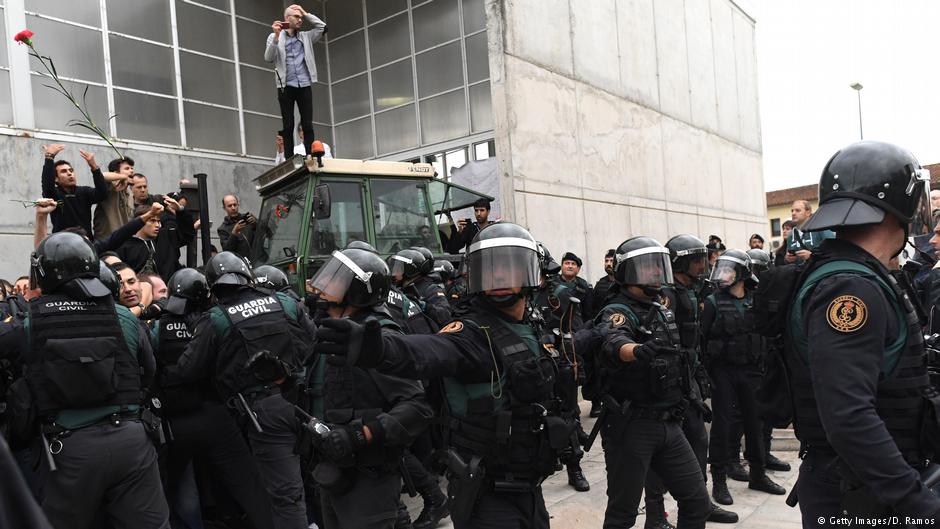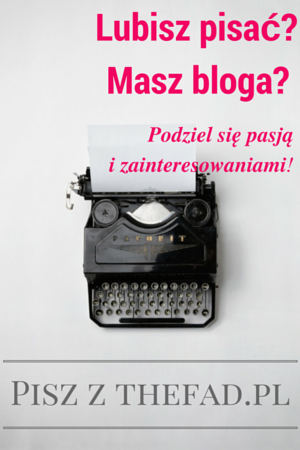Police trying to shut down a banned independence referendum in Catalonia have clashed with voters at several polling stations. Thousands of officers have been deployed across the region with orders to seize ballot boxes.
Riot police reportedly fired rubber bullets at protesters outside a Barcelona polling station amid rising tensions over Sunday's disputed referendum.
According to local media, officers fired while trying to clear a crowd blocking them from leaving with confiscated ballot boxes from the voting center. Catalan emergency services said 38 people were wounded, mostly with minor injuries.
Scuffles also broke out near the Catalan city of Girona, where separatist leader Carles Puigdemont was due to cast his ballot. Television footage showed police forcing their way into the voting center in Sant Julia de Ramis, using batons to disperse would-be voters before smashing through a glass door. Officers with shields and helmets were seen dragging people away. Following the raid, Puigdemont later cast his vote at a different polling station in the village of Cornella del Terri.
"The unjustified use of violence, which is both irrational and irresponsible, by the Spanish state will not stop the will of the Catalan people," Puigdemont told reporters.
Spanish government delegate to Catalonia, Enric Millo, said the police intervention was necessary to stop the unauthorized vote, adding that the officers' main aim was to remove election materials. "We were forced to do what we did not wish to do," he said.
Police and Civil Guard officers have been deployed across the region to seize ballot boxes and papers, the country's Interior Ministry said.
"These are the first ballot boxes and ballots seized by police in Barcelona. Officers are continuing their deployment in Catalonia," the Interior Ministry said in a Twitter message that included a picture of four plastic ballot boxes and piles of ballots.
Ballot papers and boxes with the seal of the Catalan government had appeared at dozens of referendum sites in Catalonia overnight Sunday amid chants of "Votarem" (We will vote), despite earlier claims by the Spanish government that it had succeeded in stopping the "illegal" referendum.
A Catalan regional official said 73 percent of polling stations were open, despite efforts by the central government to stop the vote. DW's Mariel Müller was on hand when the boxes arrived at one school.
Ballot boxes arrive at #escolaindustrial where voters wait for hours to cast their vote #CatalanReferendum #1o #Ref1oct pic.twitter.com/9lcNqjmyWE
— Mariel Müller (@EscribeMariel) October 1, 2017
Many supporters of Catalan independence spent the night in schools and other polling places in an effort to keep them open until voting begins Sunday at 9 a.m. (0700 UTC).
Thousands of people began to stand in line outside polling stations on Sunday morning from 5 a.m. local time.
Aquest és el panorama a les 5:00 a la porta del col·legi electoral on ens toca votar. #1OctCardedeu pic.twitter.com/dqmMaSh5Ts
— Albert Cuesta (@albertcuesta) October 1, 2017
Around the same time, 30 civil guard vans and trucks with police left Barcelona port. Police have been brought in from other regions of Spain to prevent the vote taking place.
Catalan government officials said Sunday morning that people could use ballots they print at home and vote at any open polling station if their designated booth was closed.
Resolving a serious political battle
Catalan leader Puigdemont called for "mediation" Saturday to resolve the "serious" political battle dividing his regional authority from the central government in Madrid.
"If the yes wins, if the no wins — in any scenario there must be mediation because things aren't working," he said in an interview with the Agence France-Presse news agency.
Puigdemont did no say directly who should mediate Spain's internal feud but indicated that the European Union should fill the void.
"I think that from now it would be logical for the EU to actively monitor [the situation] and actively take an interest," he said. "If it doesn't take an interest in what is happening in Catalonia when everyone is watching and taking an interest, there's something wrong."
But Brussels has preferred to sit on the sidelines of what it views as an internal dispute in Spain. The block has only warned Catalans that if they were to secede from Spain they would have to apply for EU membership, which Madrid would have authority to block.
Voting stations blocked
Meanwhile, the Spanish government said the majority of designated voting stations in Catalonia had been shut down to prevent the banned referendum from going ahead.
Madrid, which has declared the referendum illegal, has vowed to block the poll. Thousands of extra police have been deployed to the northeastern region with orders to evacuate and shut down potential voting stations by 6 a.m. on Sunday. Police have been given orders to confiscate ballots and ballot boxes and to refrain from using force.
Spanish Foreign Minister Alfonso Dastis called Catalonia's plan to hold the independence referendum "a mockery of democracy."
Referendum organizers asked voters to turn up at 7 a.m. ahead of the polls opening at 9 a.m. "We must organize it so that there are long queues to give the image to the world that we are going to vote," instructions sent to voters read.
"Act in a peaceful way and do not respond to any provocation, from other citizens or from police."
Huge protests
Thousands of people gathered in central Madrid on Saturday to protest against the planned secession vote. Waving Spanish flags, they chanted "Viva Espana," "Spanish unity" and "Catalonia is Spain." Some of the protesters also called for pro-independence Catalan leader Carles Puigdemont to be put in jail.
Met plenty of anti independence supporters in Barcelona too. ‘Spain is a family. Catalonia is part of that family’. None said they’ll vote pic.twitter.com/Bf4PwNNHrJ
— Peter Geoghegan (@PeterKGeoghegan) September 30, 2017
Catalans get ready for disputed #CatalanReferendum. I spoke to some about the reasons for their decision. (I couldn't find a "No" voter) pic.twitter.com/9jX9Q8Rli2
— Mariel Müller (@EscribeMariel) September 30, 2017
DW journalist Peter Geoghegan was in Barcelona during a Spanish unity rally while DW's Mariel Müller could not find anyone ready to vote "no" in the referendum.
The unity demonstration was the largest in the Spanish capital since the referendum was called earlier this year. Similar rallies also took place in other cities, including Malaga, Cordoba, Seville, Santander, Palma de Mallorca and Zaragoza.
The atmosphere was different in Catalonia's regional capital Barcelona on Friday night, as huge crowds turned out to show their support for the independence campaign. Earlier in the day, farmers drove tractors through the center of the city, vowing to help protect polling stations from police.
A large majority of Catalans back the idea of holding a legitimate referendum, but they are split over independence itself.





